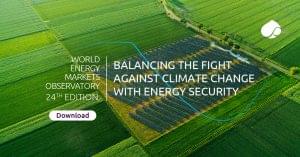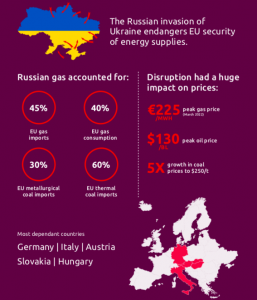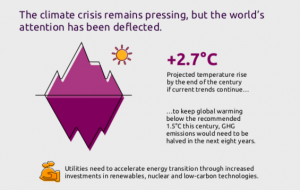World energy market report: security of gas supply depends on these three factors
A balance must be found between two equally important imperatives: the security of affordable energy supply and the fight against climate change are the most important issues of the time ahead.

The latest version of Capgemini’s World Energy Markets Observatory (WEMO) calls for reform of the structure of the energy market. The results of the research highlight that the sustainability of the energy supply and green investments should play just as important a key role in the management of the energy crisis as the most urgent issues of the present, such as dependence on Russian gas.
A cure for the energy crisis: energy reduction and gas storage
Following the Russian invasion of Ukraine, the long-term risk of European dependence on Russian gas has reached a breaking point. Over the past two decades, Europe’s dependence on Russian gas, especially Germany’s, has increased with the decline in European gas production and the increase in gas consumption. Currently, as Europe is forced to withdraw from Russian gas supplies, the security of gas supply depends on three factors: the capacity of gas storage facilities, the determination of gas import routes and, most importantly, the effectiveness of energy reduction campaigns. Efforts to save energy, which have already been implemented in many European countries, can trigger significant changes.

Acceleration is needed: the development of renewable energy sources must be accelerated
According to new EU plans to accelerate the spread of renewable energy sources in order to become independent from Russian supply and to electrify the economy, an additional 26 billion euros will be needed for energy investments by 2027. Currently, technologies using wind and solar energy are proving to be the most promising solution. According to Colette Lewiner, senior energy and utilities consultant at Capgemini, “You have to strike a delicate balance. This means making the right decisions about short-term solutions such as solar and wind power, while in the longer term, building third-generation large-scale nuclear power plants or small-scale nuclear modular reactors (SMRs) in countries that can afford such projects to realize. We have to see the emerging solutions and the expected results realistically. For example, due to economic and technical reasons, hydrogen cannot predictably achieve net zero emissions until the middle of the century. Therefore, green hydrogen should be reserved for industries where it is difficult to reduce CO2 emissions.”
Among the available renewable solutions, solar energy has a significant growth potential, as innovative materials and methods for maximizing solar energy show progress. Solar energy production plants are also more favorable for local communities compared to wind farms. Currently, however, 75% of photovoltaic (PV) solar panels are sent to the EU from China. Therefore, Europe needs to be careful not to replace its dependence on Russian gas with dependence on actors such as China.
The issue of carbon dioxide emissions also remains in focus
The energy crisis also delays the closure of coal-generating units, which increases carbon dioxide emissions. Carbon Capture Usage and Storage (CCUS) technologies are essential tools for reducing carbon dioxide emissions. That is why the creation of power plants operated with this technology and related investments must be accelerated. In 2021, 97 new power plants operated with CCUS technology were announced; three quarters of the projects under development are provided by the USA and Europe. Investments must clearly be continued: the carbon dioxide sequestration capacity must be increased by 2030 in order to achieve the goal of net zero emissions by 2050.
James Forrest, global head of energy and utilities at Capgemini, said: “While energy security has been neglected in recent years in favor of the fight against climate change, the current crisis presents an opportunity for global energy markets and governments to address both issues simultaneously. In the short term, with solutions such as energy reduction, the use of solar and wind energy, and further exploitation of the largest climate change packages in history, we can make significant progress in all areas.”

Related news
What makes us add the product to the cart – research
The latest joint research by PwC and Publicis Groupe Hungary…
Read more >Henkel Hungary: Career, values, timeless trust
One of the world’s most comprehensive employer brand research studies,…
Read more >Germany’s largest study on vegetarianism and vegan nutrition launched
Plant-based diets are becoming increasingly popular worldwide: more and more…
Read more >Related news
Vegan barbecues will cost more in Germany this year
In Germany the price of vegan grilling products grew by…
Read more >Google and German Retail Association Launch AI Training Initiative
Google and the German Retail Association (HDE) have announced a…
Read more >Carlos Alcaraz Joins Danone as Global Ambassador
Convinced that combining a good diet and sports habits from…
Read more >






